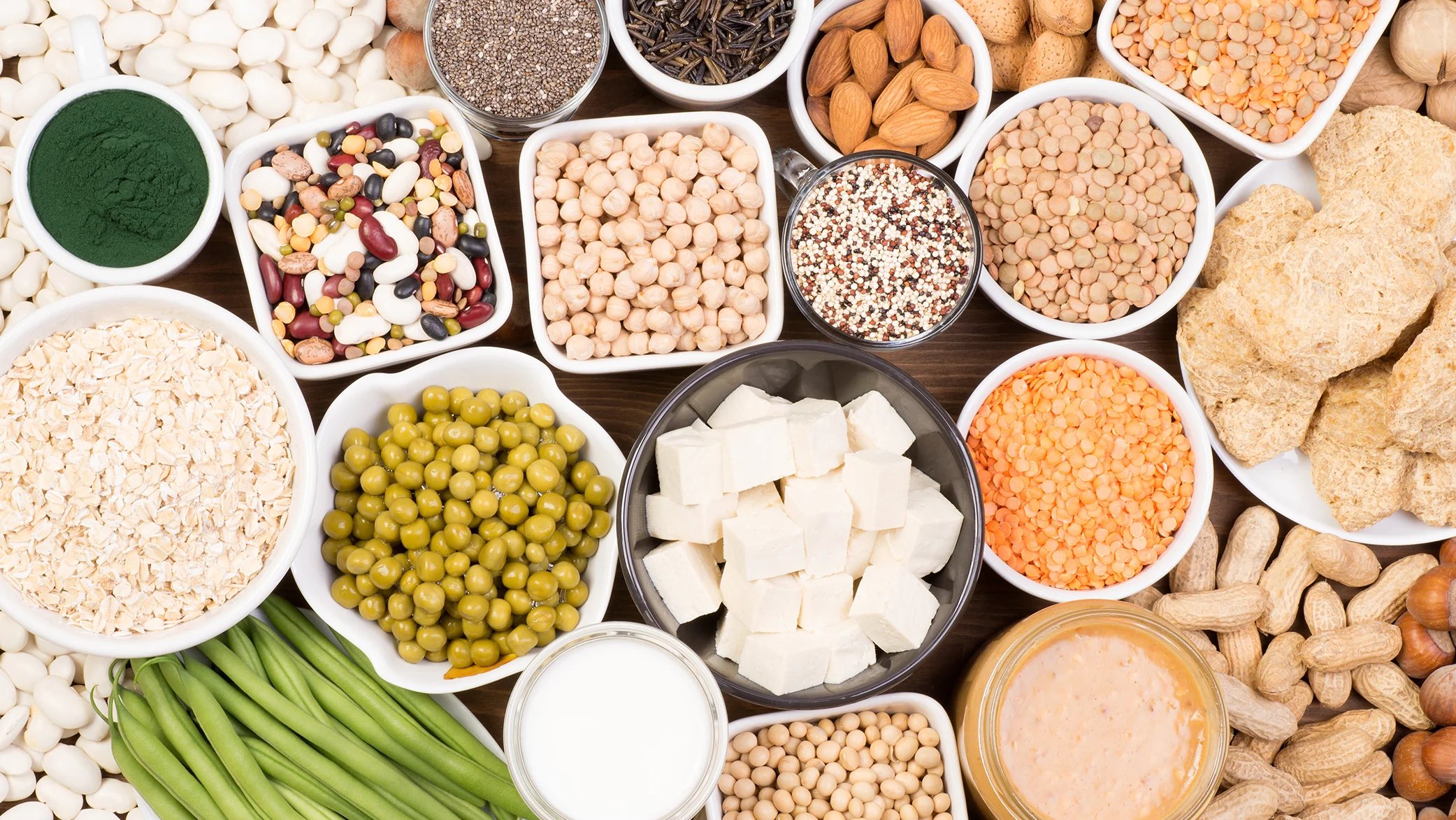How to Get Enough Protein on a Plant-Based Diet

Whether you’re new to the world of plant-based eating or you’ve been living a vegan lifestyle for a while, you’ve probably been asked “how do you get enough protein?”
Let us help you answer that question, so you don’t have to.
All About Amino Acids
Our body converts protein into amino acids to be used to repair and rebuild muscles. A complete protein source is one that provides certain amounts of all essential amino acids: histidine, isoleucine, leucine, lysine, methionine, phenylalanine, threonine, tryptophan, and valine.
Essential amino acids need to be consumed in diet. While not all plant-based sources of protein contain all essential amino acids in the proportions your body needs, eating a variety of foods, like beans, nuts, seeds, and whole grains or consuming a protein shake like Vega Sport® Protein can provide a complete amino acid profile.
Give Me the Numbers
Let’s talk digits. Individual needs vary however you can use this as a general guideline to calculate daily protein needs (in grams of protein per kilogram of body weight).
- Adult Men and Women: 0.8 g/kg/day1
- Endurance-trained athletes: 2 to 1.4 g/kg/day1
- Strength-trained athletes: 4 to 1.8 g/kg/day1
Want to try this conversion out yourself? Let’s say you’re a 130 pound woman who is training for a marathon.
- Convert pounds into kilograms by dividing by 2.2. 130 divided by 2.2 is 59 kilograms.
- For your level of training, a minimum of 1.2 grams per kilogram per day is required. 59 x 1.2 grams = 70 grams of protein per day.
That’s as simple as three meals with 20 grams of protein each, and two snacks with 5 grams of protein each. Check the labels of your favorite foods to see how many grams of protein each serving contains. And for an easy way to add 20 grams of protein to your day, add a scoop of Vega One® All-in-One Shake to your morning smoothie.
Can I Build Muscle with Vegan Protein?
Absolutely! Plant based protein can help support your goals. BCAAs are considered to be especially beneficial after a workout.
BCAAs
Branched chain amino acids (leucine, isoleucine, and valine) particularly leucine signals muscle protein synthesis. Brown rice, hemp and pea proteins contain BCAAs.
What Are the Best Sources of Plant-Based Protein?
From beans to nuts to seeds to whole grains to greens like spinach, there’s plenty of ways to get enough protein on a plant-based diet.
Buckwheat
Though it contains the word “wheat,” buckwheat is actually gluten-free. Buckwheat groats make a fantastic alternative to rice pilaf and will give you 22 grams of protein per 1 cup.2
Tempeh
Tempeh is a traditionally fermented type of soy. It has 16 grams of protein per 1/2 cup.2 Tempeh soaks up all marinade flavors, so try it in a stir-fry.
Brussels sprouts
One cup of cooked Brussels sprouts has 4 grams of protein.2 Try roasting Brussels sprouts under your broiler for a flavorful side dish.
Broccoli
Whether sautéed or roasted, broccoli is a surprising source of protein. Per cup of chopped, cooked broccoli, you’re getting 4 grams of protein.2
Spinach
Yes, spinach. A cup of cooked spinach has 5 grams of protein.2 To eyeball that on your plate, picture the size of a baseball or roughly the size of your fist.
Green Peas
A perfect side dish to your dinner, green peas have nearly 9 grams of protein per cup once cooked.2
Chia Seeds
Though small, these seeds pack a protein punch—15 grams of protein per ½ cup.2 If you’ve already fallen in love with chia pudding, try adding chia to your protein bites.
Hempseeds
Raw hempseeds have 10 grams of protein in 3 tablespoons.2 With a pleasant nutty taste, hempseeds make a great addition to salads and stir-fries.
Pumpkin Seeds
Roasted pumpkin seeds make a great snack and contain 10 grams of protein per 1/4 cup.2
Kidney, Navy, and Black Beans
While lentils and split peas are technically legumes, these true beans are great in stir-fries or on salads. No matter the type, you’ll average about 15 grams of protein per cup of beans once cooked.2
Lentils
Lentils pack 16 grams of protein per cup once cooked.2 And since most only take 20 to 30 minutes to cook they’re ideal for a quick meal.
Prefer this information in an infographic? We’ve got one of those for you right here.
References
- Lemon, P. W. (1995, June). Do athletes need more dietary protein and amino acids? Retrieved from https://www.ncbi.nlm.nih.gov/pubmed/7550257
- National Nutrient Database for Standard Reference. Accessed on 5/22/2020 from: http://ndb.nal.usda.gov/
Related Articles
-
 Read article
Read articleA Beginner's Guide to Plant-Based Protein Powder
New to plant-based? New to Vega? Start with our plant-based guide to answer your most frequently...
-
 Read article
Read articleHow to Make a Smoothie Fast, Without a Blender
It’s time for Smoothie 101. Make smoothies fast, using tools you already have in your kitchen....
-
 Read article
Read articleWhat to Eat During A Workout
Not sure what to eat during a workout? Toss the orange slices and pick up one...





